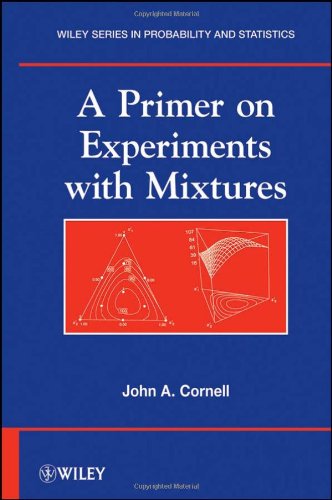

Most ebook files are in PDF format, so you can easily read them using various software such as Foxit Reader or directly on the Google Chrome browser.
Some ebook files are released by publishers in other formats such as .awz, .mobi, .epub, .fb2, etc. You may need to install specific software to read these formats on mobile/PC, such as Calibre.
Please read the tutorial at this link. https://ebooknice.com/page/post?id=faq
We offer FREE conversion to the popular formats you request; however, this may take some time. Therefore, right after payment, please email us, and we will try to provide the service as quickly as possible.
For some exceptional file formats or broken links (if any), please refrain from opening any disputes. Instead, email us first, and we will try to assist within a maximum of 6 hours.
EbookNice Team

Status:
Available4.7
17 reviewsInspired by the author's bestselling advanced book on the topic, A Primer on Experiments with Mixtures provides an introductory presentation of the key principles behind experimenting with mixtures. Outlining useful techniques through an applied approach with examples from real research situations, the book supplies a comprehensive discussion of how to design and set up basic mixture experiments, then analyze the data and draw inferences from results.
Drawing from his extensive experience teaching the topic at various levels, the author presents the mixture experiments in an easy-to-follow manner that is void of unnecessary formulas and theory. Succinct presentations explore key methods and techniques for carrying out basic mixture experiments, including:
Designs and models for exploring the entire simplex factor space, with coverage of simplex-lattice and simplex-centroid designs, canonical polynomials, the plotting of individual residuals, and axial designs
Multiple constraints on the component proportions in the form of lower and/or upper bounds, introducing L-Pseudocomponents, multicomponent constraints, and multiple lattice designs for major and minor component classifications
Techniques for analyzing mixture data such as model reduction and screening components, as well as additional topics such as measuring the leverage of certain design points
Models containing ratios of the components, Cox's mixture polynomials, and the fitting of a slack variable model
A review of least squares and the analysis of variance for fitting data
Each chapter concludes with a summary and appendices with details on the technical aspects of the material. Throughout the book, exercise sets with selected answers allow readers to test their comprehension of the material, and References and Recommended Reading sections outline further resources for study of the presented topics.
A Primer on Experiments with Mixtures is an excellent book for one-semester courses on mixture designs and can also serve as a supplement for design of experiments courses at the upper-undergraduate and graduate levels. It is also a suitable reference for practitioners and researchers who have an interest in experiments with mixtures and would like to learn more about the related mixture designs and models.